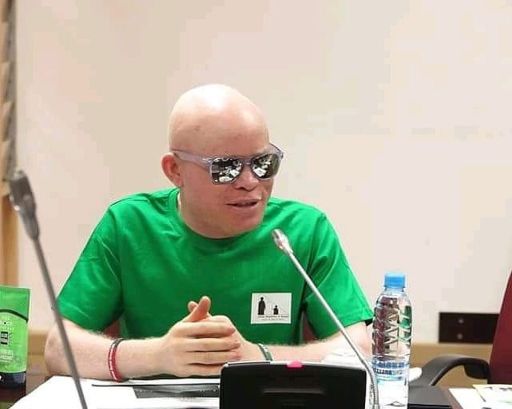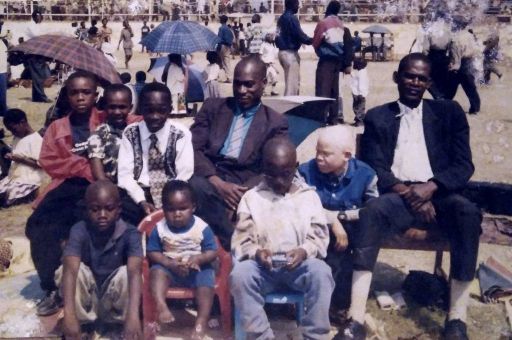The moving coming-of-age drama film “Can You See Us” on Netflix is about Joseph, a little kid with albinism who is abandoned by his own father at birth. He experiences a lot of taunting and bullying as he grows up from adults and peers, which causes him to feel conflicted about his identity. Joseph eventually finds comfort in music, though, and after overcoming all obstacles, he rises to become one of Zambia’s most well-known singers. Many people are interested in learning more about the famous Zambian musician John Chiti and his journey because it is known that the movie was based on his life. Here are all the solutions you require if you share my curiosity.
Who is John Chiti?
In the city of Ndola in Zambia’s Copperbelt Province, John Chiti was born in 1985. His father apparently abandoned him as a baby due to his albinism, and his parents later divorced. He was the oldest of his six siblings and had a difficult childhood. “My family was perplexed when I was born. My parents’ split resulted from their inability to accept that I belonged, the musician said in a 2020 interview with Reuters. As a result, Chiti remained with his mother until her death when he was just eight years old. After she passed away, he moved in with his father, who happily was now more understanding of his son’s situation.
Even yet, Chiti continued to struggle since people often called him offensive names and made rude remarks, including bystanders, instructors, peers, and even his own relatives. This is because albinism had a significant stigma in Zambia at the time, and he experienced discrimination even at school. Additionally, Chiti’s poor eyesight made it difficult for him to handle the academic strain, and his teachers would discipline him harsher than the other youngsters. Sadly, he even had to stop playing football, his favourite sport.
Chiti persisted nevertheless, enrolling in the Munali Boys Secondary School in Lusaka, Zambia, where he discovered that music was his true calling. “Music served as a haven. The first time I performed, someone who had bullied me applauded for me, and I remember thinking, “Wow, music is a powerful force,” the singer recalled in the same interview. He apparently began writing gospel music and was a member of a high school band because of his Christian faith.
Chiti decided to make R&B music his full-time job after graduating from high school in 2005 because he quickly realised that it was his genuine calling. In 2008, “Ifindingile,” his debut album, was made available. It was widely hailed as Chiti’s “breakthrough” in the R&B market and won him numerous honours, including the 2008 NGOMA Award for Most Promising Artist of the Year. He was the first person with albinism to become a recording artist in Zambia, and on top of that, he received the Humanitarian Award.
Where is John Chiti Now?
John Chiti has not looked back since making his musical debut, and with five successful albums under his belt, he is currently one of Zambia’s most well-liked singers. Following the release of his debut record, he dealt with several people who have albinism while making TV appearances and toured the nation. He understood that many others who were like him had to endure great hardships in order to live honourably. Chiti started organising the albinism community in reference to their governance rights using his resources and popularity, and in 2008 he established the Albinism Foundation of Zambia (AFZ).
View this post on Instagram
AZF, a non-governmental organisation that is the first of its kind in the African nation, works to end prejudice and defend and advance the rights of individuals with albinism in Zambia. Chiti, who serves as the organization’s executive director, also aids the albinism community in obtaining better legal and medical care. The singer identifies himself as a music activist and enjoys writing songs about social topics that are important to him outside of his job with AZF.
For instance, Chiti collaborated with the Norwegian Association of the Disabled and the Cheshire Homes Society of Zambia for his 2020 music video “Corona Virus.” During the COVID-19 epidemic, it was emphasised that persons with disabilities should not be disregarded, particularly the albinism group, which saw significant violence as a result of people’s growing superstitious beliefs and was denied healthcare. The musician was named the UN Goodwill Ambassador for the “Leave No One Behind Africa 2030 Campaign” in recognition of his humanitarian contributions. He joined the Zambia Police Service Commission in February 2022.
In an effort to be his most genuine self and promote the gospel via his music, Chiti is gradually going back to his origins as an African gospel artist. He graduated from Wagner College with a certificate in civic leadership in 2018 as part of the coveted Mandela Washington Fellowship. In addition, Chiti serves as the CEO of the Talent Development Centre (TDC), which he founded in 2017 to “discover, develop, produce, and promote talent in youth, thereby empowering them to earn a living.” The musician and campaigner is happily married to Mercy Chiti; the couple, along with their two children, resides in Lusaka.



